Welcome
....to JusticeGhana Group

JusticeGhana is a Non-Governmental [and-not-for- profit] Organization (NGO) with a strong belief in Justice, Security and Progress....” More Details
Germany's state churches seek survival strategies
- Details
- Category: The World
- Created on Wednesday, 20 August 2014 00:00
- Hits: 6077
 Germany's state churches seek survival strategies
Germany's state churches seek survival strategies
No end to the turmoil in Ferguson
- Details
- Category: The World
- Created on Tuesday, 19 August 2014 00:00
- Hits: 4803
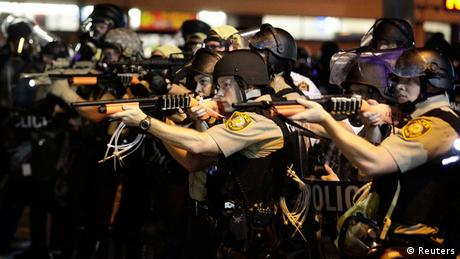 No end to the turmoil in Ferguson
No end to the turmoil in Ferguson
The deployment of National Guard troops and a night-time curfew do not seem to have calmed the uneasy situation in Ferguson in the US state of Missouri. On the contrary, the mood in the town has deteriorated.
As night falls over Ferguson, tensions rise: Will there be more riots? Will police again use tear gas to keep demonstrators - some of them all too ready to become violent - in check?
Missouri Governor Jay Nixon has lifted the nighttime curfew he imposed on Saturday, hoping that things would have calmed down in the ten days that have passed since Michael Brown, an African American teenager, was fatally shot by a white police officer. But it is a forlorn hope. Armed vehicles of the National Guard are patrolling the streets of this small town of around 21,000 residents, and even at midnight there are police helicopters circling overhead.
Many journalists are being prevented from approaching the demonstrators. Some of them have even been temporarily detained, such as Asgar Graw, a correspondent for the German newspaper Welt, and Frank Hermann from the Rheinische Post. Rumors run rife about where demonstrators and security forces are currently clashing with one another.
Lack of trust
Jay Nixon ordered in the National Guard to protect police headquarters and shopping precincts in Ferguson. The security forces, visibly jumpy, tell groups of young people to disperse: "Keep moving!" is the order of the day. But many demonstrators do not heed their calls, sometimes provoking the police and National Guard personnel. The police are still in charge of public law and order. However, practically every African American resident with whom you speak doesn't trust them.
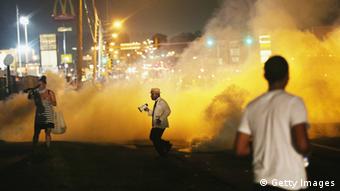 Missouri residents are bemused by the deployment of the National Guard to keep American demonstrators under control. In the past, the National Guard has been called upon to help in St. Louis - of which Ferguson is a suburb - mostly when a natural disaster has hit: for example, when snow has blocked streets in winter or during flooding in the warmer months.
Missouri residents are bemused by the deployment of the National Guard to keep American demonstrators under control. In the past, the National Guard has been called upon to help in St. Louis - of which Ferguson is a suburb - mostly when a natural disaster has hit: for example, when snow has blocked streets in winter or during flooding in the warmer months.
Only once since the Second World War, in April 1968, did the National Guard have to join police in restoring law and order. That was during the violent riots triggered by the assassination of civil rights activist Martin Luther King Jr. A force of 1,500 from the National Guard was deployed so that life could return to normal. This time, the contingent is smaller, but the authorities have declined to say exactly how large it is, instead taking pains to insist on the insignificance of its role.
'A cop is a cop'
Whether National Guard or police - youth in the town center of Ferguson aren't making any distinctions. "A cop is a cop," says one young man, who doesn't want to give his name. That's not exactly what one would call confidence in state authority. And that seems to be at the root of the problems in Ferguson at the moment: Whatever politicians, state prosecutors or police chiefs say at hastily arranged televised press conferences, for many people in Ferguson it is just so much hot air - promises that cannot be trusted.
The mood in the city hasn't been good for years, says one African American who works in a hotel right next to the airport. Many blacks are without jobs, he says. And, he maintains, even those who do have one don't earn enough to live on. "We want justice," a group of several dozen youths call out as they go through the town center of Ferguson at night. If you talk with them, it quickly becomes clear what they really mean: The arrest of Darren Wilson, the police officer who shot Michael Brown, apparently from extremely close range.
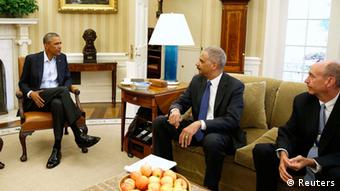 An autopsy commissioned by Brown's parents showed that their unarmed son was hit by at least six bullets. They don't trust the autopsy carried out by the local authorities. As if two autopsies weren't sufficient, Attorney General Eric Holder has already announced in Washington D.C. that there is to be a third one. On Wednesday, he intends to see for himself what is going on in Ferguson.
An autopsy commissioned by Brown's parents showed that their unarmed son was hit by at least six bullets. They don't trust the autopsy carried out by the local authorities. As if two autopsies weren't sufficient, Attorney General Eric Holder has already announced in Washington D.C. that there is to be a third one. On Wednesday, he intends to see for himself what is going on in Ferguson.
Date 19.08.2014
Author Miodrag Soric/tj
Editor Spencer Kimball
Source: Deutsche Welle
Airstrikes in Iraq a way out for Obama?
- Details
- Category: Current Issues
- Created on Saturday, 09 August 2014 00:00
- Hits: 4522
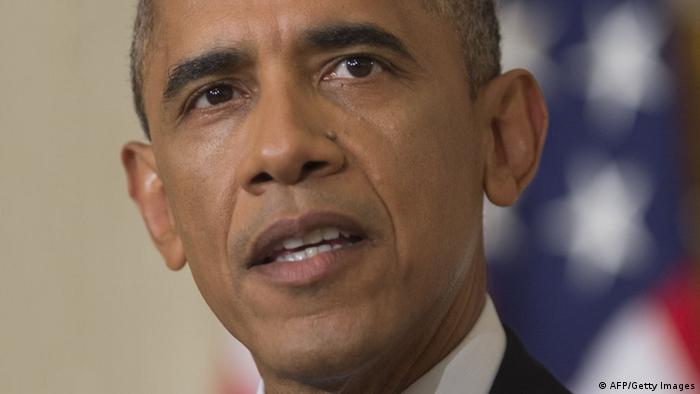 Airstrikes in Iraq a way out for Obama?
Airstrikes in Iraq a way out for Obama?
Barack Obama has been facing criticism for months. For a clear majority of Americans, he has reacted too slowly when it comes to US foreign policy. But the airstrikes in Iraq may silence his critics.
US President Barack Obama wanted to be remembered as the president who finally ended the US military mission in Iraq. Instead, after a long hesitation, he has now decided on military intervention and this week ordered airstrikes on fighters with the militant group "Islamic State" (IS). This makes him the fourth successive US president to be responsible for military operations in Iraq.
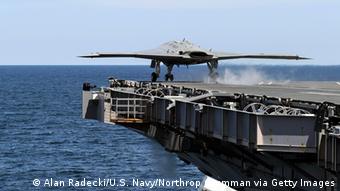 "You don't have to have a ton of insight to know he feels reluctant," said Douglas Ollivant, a former Iraq adviser for Obama, in an interview with the "New York Times" on Thursday (07.08.2014). "He wants the Iraq problem not to exist." But recent events have forced him to make some sort of decision.
"You don't have to have a ton of insight to know he feels reluctant," said Douglas Ollivant, a former Iraq adviser for Obama, in an interview with the "New York Times" on Thursday (07.08.2014). "He wants the Iraq problem not to exist." But recent events have forced him to make some sort of decision.
The president has long been criticized at home for his reluctance to act. "I think he is in a weak position," said Samuel Brannen, a security expert at the Center for Strategic and International Studies (CSIS) think tank in Washington D.C., speaking to DW. "There is growing discontent by Republicans and by Democrats on how he is handling foreign policy."
Republicans calling for airstrikes in Syria
In a joint statement, top Republican senators Lindsey Graham and John McCain have criticized Obama's decision for not going far enough. On Friday, they called on the president to order airstrikes not only in Iraq but also in Syria. Brannen, however, believes this opinion is not shared by many in Washington.
Behind closed doors, he says, many high-ranking supporters of Obama have also been growing frustrated with his policies. Like many Republicans, they have criticized Obama's foreign policy for "too much talk and not enough action." Even public opinion of the president has hit record new lows. In a recent survey, 60 percent of Americans said they were dissatisfied with current US foreign policy.
Fight over political legacy
 But there may be a silver lining on the horizon for Obama. "There's always the rally-'round-the-flag response in the US," pointed out Brannen. "When the president decides to use military force, the country gets behind him."
But there may be a silver lining on the horizon for Obama. "There's always the rally-'round-the-flag response in the US," pointed out Brannen. "When the president decides to use military force, the country gets behind him."
Brannen said that the humanitarian suffering of civilians in northern Iraq, along with reports of what Obama has called the "barbaric acts of the 'Islamic State'" are things that the American people will have no trouble using force against. "So you will see strong support for these military operations."
If he wants to avoid further political pressure on the domestic front, Obama must now be decisive and prove that the US is still able to exert its influence in a crisis anywhere in the world - in Ukraine, the Middle East or even in Iraq. It's the only way he can save his political legacy.
Date 09.08.2014
Author Jan Fritsche / cmk
Editor Richard Connor
Source: Deutsche Welle
Top ten most dangerous viruses in the world
- Details
- Category: The World
- Created on Tuesday, 12 August 2014 00:00
- Hits: 5645
 Top ten most dangerous viruses in the world
Top ten most dangerous viruses in the world
The Ebola virus may be terrifying, but it's not the most dangerous virus in the world. It isn't HIV either. Here is DW's top ten list of the most dangerous viruses.
1. The most dangerous virus is the Marburg virus. It is named after a small and idyllic town on the river Lahn - but that has nothing to do with the disease itself. The Marburg virus is a hemorrhagic fever virus. As with Ebola, the Marburg virus causes convulsions and bleeding of mucous membranes, skin and organs. It has a fatality rate of 90 percent.
2. There are five strains of the Ebola virus, each named after countries and regions in Africa: Zaire, Sudan, Tai Forest, Bundibugyo and Reston. The Zaire Ebola virus is the deadliest, with a mortality rate of 90 percent. It is the strain currently spreading through Guinea, Sierra Leone and Liberia, and beyond. Scientists say flying foxes probably brought the Zaire Ebola virus into cities.
3. The Hantavirus describes several types of viruses. It is named after a river where American soldiers were first thought to have been infected with the Hantavirus, during the Korean War in 1950. Symptoms include lung disease, fever and kidney failure.
4. The various strains of bird flu regularly cause panic - which is perhaps justified because the mortality rate is 70 percent. But in fact the risk of contracting the H5N1 strain - one of the best known - is quite low. You can only be infected through direct contact with poultry. It is said this explains why most cases appear in Asia, where people often live close to chickens.
5. A nurse in Nigeria was the first person to be infected with the Lassa virus. The virus is transmitted by rodents. Cases can be endemic - which means the virus occurs in a specific region, such as in western Africa, and can reoccur there at any time. Scientists assume that 15 percent of rodents in western Africa carry the virus.
 6. The Junin virus is associated with Argentine hemorrhagic fever. People infected with the virus suffer from tissue inflammation, sepsis and skin bleeding. The problem is that the symptoms can appear to be so common that the disease is rarely detected or identified in the first instance.
6. The Junin virus is associated with Argentine hemorrhagic fever. People infected with the virus suffer from tissue inflammation, sepsis and skin bleeding. The problem is that the symptoms can appear to be so common that the disease is rarely detected or identified in the first instance.
7. The Crimea-Congo fever virus is transmitted by ticks. It is similar to the Ebola and Marburg viruses in the way it progresses. During the first days of infection, sufferers present with pin-sized bleedings in the face, mouth and the pharynx.
8. The Machupo virus is associated with Bolivian hemorrhagic fever, also known as black typhus. The infection causes high fever, accompanied by heavy bleedings. It progresses similar to the Junin virus. The virus can be transmitted from human to human, and rodents often the carry it.
9. Scientists discovered the Kyasanur Forest Virus (KFD) virus in woodlands on the southwestern coast of India in 1955. It is transmitted by ticks, but scientists say it is difficult to determine any carriers. It is assumed that rats, birds and boars could be hosts. People infected with the virus suffer from high fever, strong headaches and muscle pain which can cause bleedings.
10. Dengue fever is a constant threat. If you're planning a holiday in the tropics, get informed about dengue. Transmitted by mosquitoes, dengue affects between 50 and 100 million people a year in popular holiday destinations such as Thailand and India. But it's more of a problem for the 2 billion people who live in areas that are threatened by dengue fever.
Date 12.08.2014
Author Helena Schwar / re
Editor Zulfikar Abbany
Source: Deutsche Welle
Hamas: We didn't kidnap soldier
- Details
- Category: Current Issues
- Created on Saturday, 02 August 2014 00:00
- Hits: 3756
Hamas: We didn't kidnap soldier

An Israeli soldier with links to the UK may have been killed in a strike on his captors by the Israeli military, Hamas has said.
The military wing of the Palestinian organisation said in a statement on its website it was "not aware until this moment of a missing soldier or his whereabouts or the circumstances of his disappearance".
Israel earlier claimed Second Lieutenant Hadar Goldin had been kidnapped an hour after the start of a humanitarian ceasefire, but Hamas has denied holding the soldier and instead claims it lost contact with its fighters following a clash in southern Gaza.
"We believe all members of this group have died in an (Israeli) strike, including the Zionist soldier the enemy says disappeared," the statement read.
The Israeli military declined to comment on the statement.
Meanwhile, questions were being asked about whether military equipment manufactured in the UK has been used in Israel's offensive on the Palestinian enclave.
Documents obtained by The Independent showed that arms export licences worth £42 million have been granted to 130 British defence manufacturers since 2010 to sell military equipment to Israel, ranging from weapons control and targeting systems to ammunition, drones and armoured vehicles.
The Government said it was reviewing all licences to Israel, but a Labour MP said ministers were "burying their heads in the sand" over the issue of whether UK-manufactured weapons or components have been used in Gaza since the current round of hostilities began three weeks ago.
At least 1,600 Palestinians - most of them civilians - have been killed and 8,000 injured during the assault, while Israel has lost 63 soldiers and three civilians.
The planned ceasefire was shattered early yesterday, with each side blaming the other, and the situation escalated with the apparent capture of Lt Goldin. The Foreign Office was looking into claims that Lt Goldin held joint Israeli-British citizenship, though Foreign Secretary Philip Hammond said "no evidence" had been found to back up the assertion.
US president Barack Obama and United Nations secretary general Ban Ki-moon called for the soldier's immediate release but also urged restraint on all sides as Israeli troops pressed deeper into Gaza in the search for him.
Mr Hammond said: "If the reports that Hamas broke the ceasefire are correct then that is very serious indeed, as is the kidnapping of the Israeli soldier which will make it all the more difficult to re-establish the ceasefire to allow a humanitarian pause in Gaza."
Rabbi Reuven Leigh, a chaplain at Cambridge University and a rabbi in the local community, said Lt Goldin - who has a twin brother also serving with the Israeli military in Gaza - had lived in the city for a number of years.
"Shaken to hear of Hadar Goldin's kidnapping, he spent a few years living in Cambridge with his family, please pray for his safe return," he wrote on his Twitter feed.
Israeli prime minister Benjamin Netanyahu told US secretary of state John Kerry that Palestinian militants had "unilaterally and grossly" violated the ceasefire and attacked Israeli soldiers.
"Israel will take all necessary steps against those who call for our destruction and perpetrate terrorism against our citizens," he said.
Mr Obama said he would continue working towards a ceasefire and called on Israel to take steps to prevent Palestinian civilian casualties, saying: "Innocent civilians caught in the crossfire have to weigh on our conscience, and we have to do more."
Labour leader Ed Miliband said that David Cameron had put himself "in the wrong place" over Gaza by failing to make clear to Israel from the outset that its incursion would not resolve its problems with rocket attacks launched by Hamas from the territory.
Mr Miliband told LBC radio: "If I was David Cameron... I would be spending my time on doing everything I can to put pressure on both sides to have that ceasefire that is required.
"I think he is in the wrong place on this, because I agree with him about Hamas - Hamas is a terrible and disgusting organisation - but I think he should have said from the outset that this incursion by Israel into Gaza was not going to solve the problem. It isn't solving the problem, it's making it worse.
Meanwhile, Mr Miliband's brother David, the former foreign secretary and president of the International Rescue refugee charity, said that the focus of attention should be on the 1.8 million civilians in Gaza trapped inside a war zone.
Asked if Israel's deployment of military force had been "disproportionate", David Miliband told BBC2's Newsnight: "Of course. Eighty per cent of the casualties in this war have been civilians, and as the leader of a humanitarian movement, I have to defend the principle that after centuries in which civilians were caught in the crossfire of war, finally in 1949 the Geneva Convention established the absolute right to defence for civilians during war, and that is being broached.
"The heartbreaking, the heart-rending situation which faces the people of Gaza tonight is that 1.8 million of them are trapped in an area where frankly there is no safe zone, and that is completely contrary to every basic fibre of being that anyone can understand or uphold."
Official data obtained by the Campaign Against Arms Trade under the Freedom of Information Act showed that of the £42 million "military list" exports to Israel approved since 2010, some £10 million were licensed in the last 12 months.
Among manufacturers given permission to make sales were UK companies making components for the Hermes drone aircraft and Israel's main battle tank, reported The Independent. The sales are entirely lawful and make up part of a £12 billion British arms export trade.
Andrew Smith, of CAAT, told the newspaper: "There must be an immediate embargo on all arms sales and military collaboration with Israel. When governments sell weapons into war zones they cannot absolve themselves of responsibility for what happens when they are used."
And Labour MP Katy Clark said that ministers must establish whether any of the weapons or components have been used in Gaza, adding: "By refusing to investigate this vital question the British Government are trying to bury their heads in the sand. This is a shameful approach to take and frankly makes the Government look as if it has something to hide.
"The British public have the right to know the level of support which the United Kingdom has provided to the Israeli armed forces through arms sales."
A government spokesman said: "We are currently reviewing all existing export licences to Israel. All applications for export licences are assessed on a case by case basis against strict criteria. We will not issue a licence if there is a clear risk that the equipment might be used for internal repression, or if there is a clear risk that it would provoke or prolong conflict."
Deputy Prime Minister Nick Clegg urged Israel to halt its military operations and talk to Hamas.
The Liberal Democrat leader said that the Israeli military action "appears disproportionate" and would not succeed in delivering security for its people.
Writing in The Guardian, Mr Clegg said: "If Israel wants to secure lasting safety for its people, it must use political will, not military might, to break the cycle of violence.
"Prime minister Binyamin Netanyahu must now put Israel's long-term, strategic self-interest ahead of short-term, tactical military gains. It is time for the Israeli government to talk to the Hamas political leadership in Gaza. Israel's refusal to engage with president Mahmoud Abbas's new unity government, because it includes Hamas, must be reversed."
Mr Clegg said neither side could escape blame for the current crisis, but suggested Israel could win international support with "an unexpected act of political magnanimity, rather than sporadic military reprisal".
"It is difficult to deny that Israel's military action appears disproportionate and, combined with the Gaza blockade, is resulting in the collective suffering of the Palestinian people," he wrote. "Hamas cannot escape blame either. By hiding among the civilian population and stashing weapons in schools and mosques, it has shown it is willing to sacrifice its own people for military advantage."
Former Lib Dem leader and peace envoy Lord Ashdown told BBC Radio 4's Today programme that Israel should speak to Hamas.
"Neither side can blast their way to victory, so there is only one way to get peace now, and that is for the sides to sit down and start talking to each other," said Lord Ashdown.
"Hamas has to be at the table. Who's firing the rockets? It's Hamas, and so you have to talk to them... If an individual or an organisation has the support of the people who it represents, in the end you have to talk to them. We had to talk to the IRA, for goodness' sake."
Lord Ashdown said there was "no question" that Israel's military action was disproportionate, telling Today: "You have to call a spade a spade. Is it disproportionate? Yes it is, there's no question about it.
"Israel makes the excuse that because weapons are being fired from civilian areas, it's entitled to use indiscriminate total force against civilian areas. No you're not. Our troops in Afghanistan and Northern Ireland had this constantly going on - if they'd used total force against a whole civilian area because somebody had fired from it, they would have been guilty of a crime. That's not an excuse.
"To have accidentally, in the course of trying to be careful, hit a single UN school and haven, you could put down to an error in the process of trying to be careful. But to hit six, you have to conclude that's either criminally careless or carelessly indiscriminate."
Lord Ashdown described Israel's military action as "really foolish", adding: "They have had in total from thousands of Hamas rockets just two civilians killed. They've multiplied that to 60 by this operation - they've lost 60 of their own and killed thousands of Palestinians, thousands of people in Gaza, created hundreds if not thousands of terrorists, created the enmity of the entire Middle East and lost the support and sympathy of world opinion. That doesn't seem to me to be a very good dividend from military action."

Source: By Press Association


